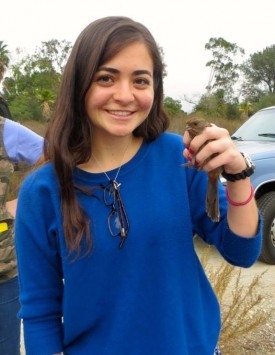Dr. Jessica Hernandez
PHD FELLOW GRADUATE | Global Change Center
VT Graduate July 2021, Biological Sciences
Advisor: Dr. Ignacio Moore
Google Scholar • Professional Site • jess228@vt.edu

Jessica Hernandez joined Dr. Ignacio Moore’s lab as a Ph.D. student in the fall of 2016, and completed her doctorate in the summer of 2021. After her Ph.D., she was awarded an NSF Postdoctoral Research Fellowship in Biology at Vanderbilt University, where her research focused on investigating the causes and consequences of diverse parasite transmission modes for both parasite and host fitness, using evolutionary immunology and a mathematical modeling approach. Dr. Hernandez is now the Director of Fellowships and Grants at Whitman University.
Jessica received her B.A. in Biology from Pomona College in 2015. In college, she researched diet patterns of chinstrap penguins; osmoregulation in White’s tree frogs; homing behavior of northern spring salamanders; and nest pathogens in loggerhead sea turtles. Jessica was able to combine her interests in endocrinology, animal behavior, and environmentally induced stressors into her undergraduate thesis. She compared testosterone concentrations in male western fence lizards found throughout urban and protected environments to better understand the effect of urbanization on reproductive physiology. She also spent a summer teaching cell biology to bilingual middle school students through the Breakthrough Collaborative program. Prior to delving into graduate school, she spent a year as a marine educator through the University of Georgia Sea Grant program, where she taught hands-on marine biology and coastal ecology classes to preschool through college students.
For her dissertation, Jessica studied a free-living population of box-nesting tree swallows (Tachcineta bicolor) that form social pair bonds throughout the breeding season yet also engage in extra-pair copulations. Through observational and experimental studies, Jessica hoped to better understand the relationship between extra-pair copulations and pathogen dynamics in a wild avian population. In addition to research, Jessica is passionate about communicating science in a way that makes sense to individuals both within the science community and outside of it. As part of the Interfaces of Global Change program, Jessica hoped to learn how to communicate her research effectively while also being exposed to perspectives stemming from more policy-oriented approaches to global change research.
Last updated August 2022.




